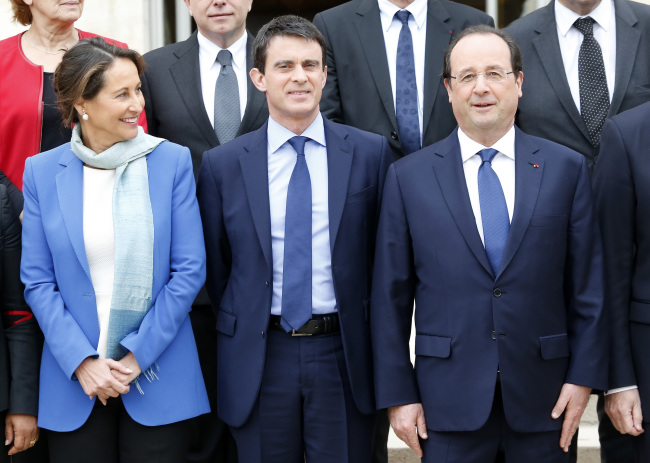RIS (AP) ― France’s new prime minister, facing a confidence vote Tuesday, promised an economic turnaround built on plans to let corporations keep more profits, cut taxes for all households, and redraw a new, less bureaucratic map.
Selling the proposals of a deeply unpopular president to his own Socialist lawmakers, Prime Minister Manuel Valls acknowledged that the Socialist defeat in recent elections showed a France of “too much suffering and not enough hope.”
Valls went before the Socialist-led national assembly for the first time since he was given the job in a government reshuffle triggered by his party’s dismal showing in local elections. Both allies and French conservatives are suspicious of the economic turnaround he is supposed to lead ― and the 50 billion euros ($69 billion) he promised to cut from the budget by 2017.
 |
French President Francois Hollande (right), new French Prime Minister Manuel Valls (center) and Environment and Energy Minister Segolene Royal pose during the weekly cabinet meeting at the Elysee Palace in Paris on April 4. (AP-Yonhap) |
With unemployment hovering around 10 percent for more than five years, minuscule economic growth, and a public debt that is a source of tension with the EU, Valls and his boss, President Francois Hollande, will need more than just confidence ― they’re hoping the vote will give them much needed room to maneuver.
At stake are jobs for 3 million unemployed French workers and prospects for the entire eurozone economy.
The Spanish-born Valls has carefully built a reputation as an uncompromising iconoclast. In 2009, he called on the Socialist Party to abandon the name “because the word ’socialism’ is without a doubt outdated. It recalls 19th-century ideas.” Valls remained in the party, as did the word “Socialist.”
In 2011, he said the 35-hour workweek was holding France back. The policy aims to boost employment by limiting employees’ work hours, but has been criticized as ineffectual.
As interior minister, he weathered intense criticism that he was violating the rights of the itinerant Roma population when his officers dismantled their camps and sent them packing. Then he came under attack for banning the shows of a controversial comic, Dieudonne, whose Nazi-like salute touched off allegations of anti-Semitism.
But as Hollande’s popularity tanked ― the president now has a 17-percent approval rating, according to one measure ― Valls’ has steadily climbed. His new job is primarily as salesman of Hollande’s economic plan, which on Tuesday Valls said would include massive cuts to payroll taxes that rank among the world’s highest, cutting the corporate income tax to 28 percent from 33 percent, and 5.5 billion euros in tax cuts for middle-class workers and merchants.
Insisting that the aim is to increase “what you’re getting at the end of the month,” he said the cuts would mean that workers earning the 1,350-euro-a-month minimum wage would end up with 500 extra euros a year, for example.
Much of Valls’s speech reiterated what had already been promised before ― including cutting in half the number of administrative regions ― but the hope is that his popularity will give households and businesses the confidence France needs to turn the economy around.
Valls eats only red meat ― never fish ― with his meals and maintains a gluten-free diet (no pastries), according to a report in the French daily Le Figaro that may have served only to enhance his reputation for austerity and toughness.
Neither one of those qualities is especially valued among French Socialists, who fear economic austerity will erode the country’s famed safety net, cost them their hold on power, and still fail to bring the deficit back within the EU limit of 3 percent of GDP, which France has missed since 2007.
“The question is whether you have a political class that is willing to commit seppuku ― honorable suicide ― by doing something for the country,” said Daniel Gros, director of the Brussels-based Center for European Policy Studies. “That is what they need to do in France, and the longer they wait the more painful it will be.”
Many economic analysts predict the EU will give France a pass this year on its deficit, as it has every year.
After Valls’ appointment last week, Medef, the country’s largest employers’ association, said the question went well beyond the Socialists’ dismal election results to the heart of France’s ability to compete in Europe and beyond.
“Our country has been losing ground little by little for years,” Pierre Gattaz, Medef’s president, said in a statement.
But many question whether Valls’ main purpose is to repackage old, failed ideas.
“The change in person is meaningless unless it also means a change in policy direction, and that is ultimately decided at least in France by the president himself,” Gros said. “One can only hope that the same man can have different ideas now and actually put them into action.”
Valls himself was cautious, trying to sell new policies to a country that is prone to violent protest and crippling strikes. “We have to deal with our public spending but without shattering our social model and our public services. If not, the French will not accept it.”








